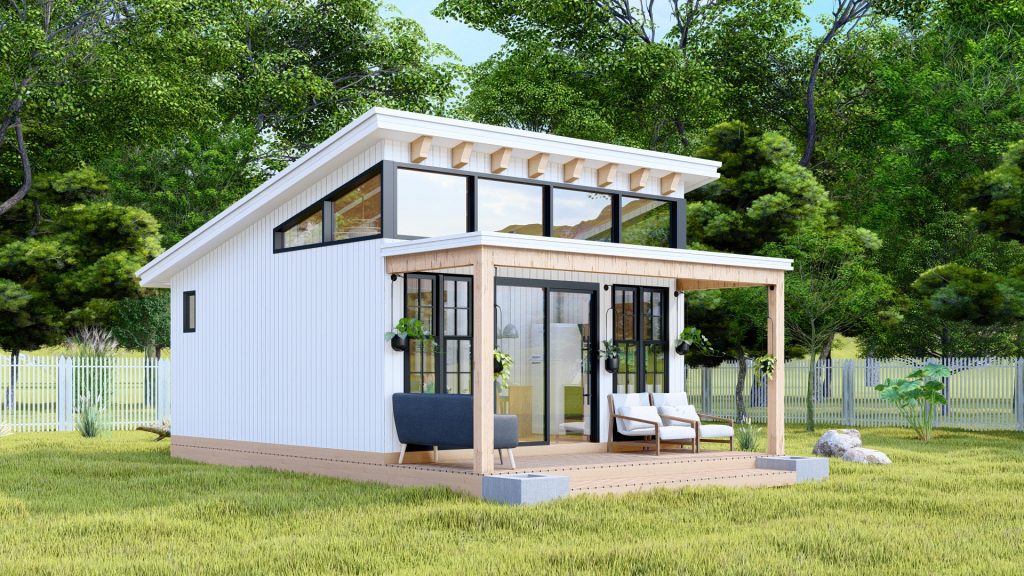As accessory dwelling units (ADUs) continue to rise in popularity, more homeowners are exploring the possibilities of adding extra living space to their properties. However, one of the first and most important decisions in the ADU planning process is choosing between an attached or detached structure.
Each option comes with its own set of benefits, challenges, and design considerations.
An attached ADU may be more cost-effective and space-efficient, while a detached ADU often offers greater privacy and long-term flexibility. The right choice depends on your property, your budget, and your intended use for the unit.
In this article, we’ll compare attached and detached ADUs in detail, outlining their key differences, advantages, and limitations. To help you make a well-informed decision tailored to your goals and property.
Common ADU Types (At a Glance)
Accessory Dwelling Units can take many forms, depending on your lot size, home layout, and goals. Some of the most common include:
- Attached ADUs – Built as part of the main home (e.g., additions, basement conversions).
- Detached ADUs – Standalone units, often in the backyard.
- Garage Conversions – Transforming an existing garage into a livable space.
- Above-Garage Units – Built above a new or existing garage.
- Interior Conversions – Repurposing attic or basement space into an independent unit.
While there are many types of ADUs, this guide focuses specifically on attached vs. detached ADUs, the two most popular options for homeowners.
What Is an Attached ADU?
An attached ADU is physically connected to the main residence, typically sharing at least one wall or structural element. These units can be created by converting existing space within the home (like a basement) or by building a new addition.
Key Characteristics
- Shares a wall, foundation, or roofline with the main home
- Often accessed through a separate entrance
- Typically shares utility connections (water, sewer, electricity)
Advantages
- Lower construction costs: Since it leverages the existing structure, an attached ADU is generally more cost-effective to build than a detached unit.
- Simpler permitting: Many jurisdictions allow attached ADUs more readily, especially if they’re within the existing footprint.
- Efficient use of space: Ideal for properties with limited outdoor room or tight zoning setbacks.
Considerations
- Less privacy: Because the unit is physically connected, sound transfer and proximity may be potential concerns.
- Design limitations: The ADU layout may be constrained by the structure of the main home.
- Reduced rental appeal: Tenants may prefer more separation, which can impact rental income potential.
Best Fit For:
- Homeowners with smaller lots
- Multigenerational families (e.g., in-laws or adult children)
- Budget-conscious builds or quick conversions (e.g., basement finishing)
What Is a Detached ADU?
A detached ADU is a standalone structure located on the same lot as the primary home. Commonly built in backyards or side yards, these units offer full separation in both structure and function, often resembling a tiny home or cottage.
Key Characteristics
- Completely separate from the main residence
- Has its own foundation, walls, and roof
- Typically requires trenching to bring utility connections and access
Advantages
- Maximum privacy: Ideal for long-term tenants, short-term rentals, or independent family members.
- Design flexibility: Freestanding construction allows for more freedom in layout, finishes, and architectural style.
- Higher rental and resale value: These units are more appealing to renters and can see higher increases in property value.
- Stronger long-term ROI: Detached ADUs tend to attract higher rental rates and have broader usage potential.
Considerations
- Higher construction costs: Building from the ground up involves more labor, materials, and digging to bring utility connections.
- Requires more land: Not suitable for small or narrow lots with limited buildable area.
- More complex permitting: Detached structures may face stricter zoning, setback, or height regulations depending on your location.
Best Fit For:
- Homeowners with larger lots and sufficient yard space
- Property owners seeking to generate rental income
- Families who want full independence for guests or relatives
- Investors prioritizing long-term property appreciation
Cost Comparison: Attached vs. Detached ADUs
Cost is often one of the biggest factors influencing which type of ADU homeowners choose. While actual costs vary based on location, materials, size, and permitting requirements, the structural differences between attached and detached ADUs create some clear financial distinctions.
Detached ADUs typically come with a higher price tag due to several key factors. Because they require a separate foundation, full structural framing, and trenching to bring utility connections, the construction process is more involved and costly. Additional site preparation, such as grading, plumbing, and electrical work, can also add to the overall expense.
In contrast, attached ADUs are generally more cost-efficient. They often utilize existing walls, roofs, or foundations from the primary home and can share systems like HVAC, plumbing, and electrical. This integration not only reduces material and labor costs but can also simplify the permitting process in many jurisdictions.
However, it’s important to consider long-term value as well: while detached ADUs require a larger upfront investment, they often yield higher rental income, offer more privacy, and contribute more significantly to property resale value.
Which ADU Is Right for You?
Ultimately, choosing between an attached or detached ADU depends on your property layout, budget, and long-term goals.
Attached ADUs are often more cost-effective and ideal for smaller property or multigenerational living, while detached ADUs offer greater privacy, flexibility, and long-term rental potential, although with a higher upfront investment. Fortunately, financing your ADU in Georgia may be more accessible than you think.
At Georgia ADU, we’re here to help you navigate that decision with confidence.
From the first consultation to the moment we hand you the keys, we’re committed to making your ADU experience exceptional. We proudly serve homeowners across Georgia, including Atlanta, Marietta, Alpharetta, Roswell, Decatur and Sandy Springs. Ready to take the next step? Explore the cities we serve and let’s start building something great together.
